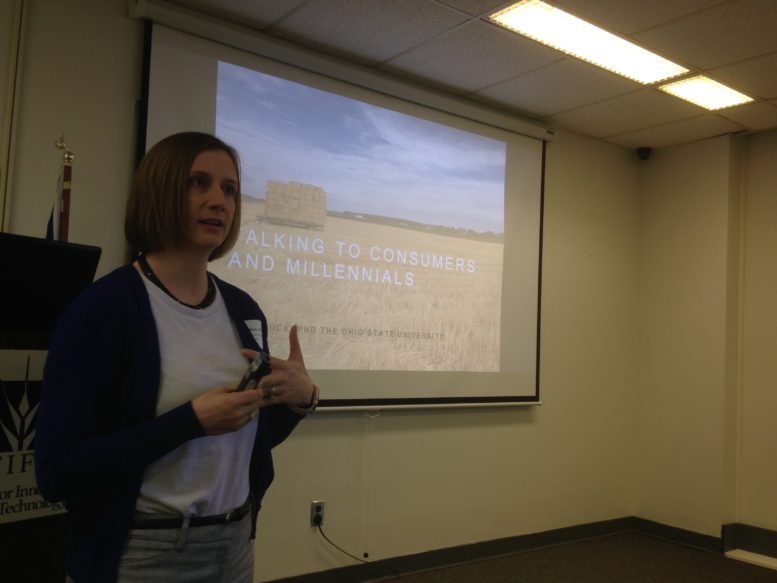By DAVID DUPONT
BG Independent News
Emily Buck, an educator, communicator and farmer, was on friendlier ground recently when she addressed the Northwest Ohio Ag-Business Breakfast Forum than she was about a month before in Washington D.C.
The proof was right there on the menu. The local group was munching on an egg and cheese dish and tiny sausages. When Buck was a member of the panel at a conference sponsored by Food Tank, lunch was hummus and mushroom burgers.
Food Tank, a group that advocates for sustainable agriculture, is not a friend of conventional farming, Buck said. She even called it “scary” at one point.
But she felt she needed to be there. She didn’t hide who she was. She and her husband, John Buck, raise corn, soybeans, and some wheat on about 1,000 acres in Marion County. She also maintains a sheep herd.
And the corn and soybeans are grown from genetically modified seed.
“This is not a friendly group by any means,” she said. “But I put myself out there because we needed someone from our side be part of the conversation.
“There are people making decisions who have never set foot on a farm. They don’t understand why GMOs are allowing me to use less herbicides, letting me have better water quality.”
People who care about sustainability are worried about air, soil, water, and habitat.
“We have to find a way to talk to people who are concerned about these things in the right way,” Buck said.
The associate professor at Ohio State urged farmers to get out of their comfort zones to engage the consumers of what they grow. That means confronting misconceptions and misunderstandings, as well as finding common ground. Facts, she said, are not enough. Connecting emotionally, connecting with the consumers’ values are the only way to get through.
In an age of instant communications, that becomes all the more important, Buck said. She quoted writer and animal scientist Temple Grandin as saying: “Every phone is a TV.”
That’s frightening for farmers. Much of what happens on the farm is not pretty, and can be misinterpreted as being cruel, she said. That makes farmers and ranchers leery of engaging the public.
But those truths need to be confronted as well. A petting zoo does not show an accurate picture of farming. So Buck said just about every year she’ll post a photo of a dead lamb. She shows it as a tragedy for the ewe, and sad for her.
Three segments of consumers drive most of the conversation, Buck said – moms, millennials, and foodies. “Those are the ones blogging and posting.”
Mothers are concerned about food safety and what they are feeding their children. They’re very savvy, she said, about social media, and that’s where they turn to get and give advice.
Millennials are “more aware of what they put in their bodies than previous generations,” she said. “That’s something to be proud of. … We have to understand where they’re coming from and how we can work with them.”
Foodies drive such trends as the demand for grass-fed beef, organic everything, and vegan diets. They form their opinions by what they find online, and what they want is transparency about how their food is produced.
She said Pew Research found 68 percent of those 18-29 buy organic products, and 48 percent believe that GMOs are not healthy. Also, 30 percent of older Baby Boomers also believe GMOs are unhealthy.
“Facts alone are not driving a lot of these decisions,” she said. People’s beliefs are shaped by what they learned when they were young. They are reinforced by sources of information that confirm those beliefs. “These are not things easy to change.”
Social science “research has shown time and again that spewing facts at someone is not going to win any argument. Relating to them and their emotions and their values will be get you so much further.”
So when she spoke at the Food Tank panel she spoke about everything she and her husband do to protect the water and soil, and how using GMOs helps them do that. “I think they thought I was one of them.”
Often when she addresses groups, she’ll start by talking about her 3-year-old daughter. Or she’ll relate farming to a garden.
Many people are scared off of social media out of fear of trolls. Buck said she loves those critics. They give her a chance to make her case, and though they are among the 2-percent whose views are unmovable, it’s those overhearing the conversation that she’s really talking to.
“Consumers will accept science and technology in everything but food,” she said. “They’re not accepting it because they don’t understand it.”
Farmers need to talk more in terms of innovation. “We’re continually trying to better what we do on the farm, continually trying to find ways to better the health of our soil.”
While people have a nostalgic view of farming in the past, those practices had ecological consequences, some as severe as the Dust Bowl.
Telling people that American agriculture is “feeding the world” doesn’t cut it. People are more concerned about what’s on their table.
It doesn’t matter whether it’s sausage or a mushroom burger. “These are not bad things,” she said. “We need to be inclusive. There’s room in the food system for all of us.”

